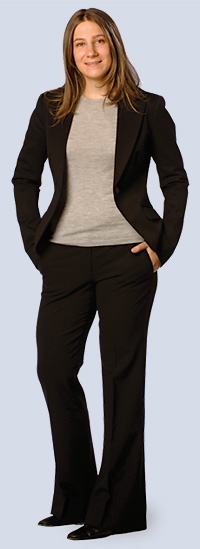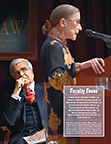Introducing Florencia Marotta-Wurgler
Assistant Professor of Law
Printer Friendly Version Professor Florencia Marotta-Wurgler ’01 was online buying a used copy of a biography of Russian intellectual Lou Andreas-Salome, when an idea for a research paper struck her. “I said, ‘Wait a second. I just gave my credit card to a stranger who lives in Sweden. How do I know that I’m going to get the book?’ What if the seller disappears in the middle of the night? Do buyers protect themselves?” recalls Marotta-Wurgler, who will teach Contracts and e-commerce beginning this fall. “And what about those econtracts that the buyer is required to click on, but rarely reads?”
Professor Florencia Marotta-Wurgler ’01 was online buying a used copy of a biography of Russian intellectual Lou Andreas-Salome, when an idea for a research paper struck her. “I said, ‘Wait a second. I just gave my credit card to a stranger who lives in Sweden. How do I know that I’m going to get the book?’ What if the seller disappears in the middle of the night? Do buyers protect themselves?” recalls Marotta-Wurgler, who will teach Contracts and e-commerce beginning this fall. “And what about those econtracts that the buyer is required to click on, but rarely reads?”
Marotta-Wurgler, 32, set out to determine whether online sellers who don’t disclose their contracts before the transaction offer worse terms than those who do. She collected and read over 515 software license agreements for products sold online. About half of the contracts in her sample were made available to the buyer on the seller’s Web site. The other half went against the basic principles of contract law, in that the buyer was not able to read the terms until after he or she purchased the product. The result of her examination, described in her yet unpublished paper “Are ‘Pay Now, Terms Later’ Contracts Worse for Buyers? Evidence From Software License Agreements,” stunned her colleagues. The hidden or “pay now, terms later” contracts offered relatively more buyer-friendly terms than those that consumers were forced to accept in advance. “While many professors have written about electronic contract formation at a theoretical level and speculated about its consequences, she’s really the first person who’s tried to discover what’s actually going on in this area,” says Law School Vice Dean Clayton Gillette.
In a companion paper, “Competition and the Quality of Standard Contracts: An Empirical Analysis of Software Agreements,” Marotta-Wurgler, an e-contracts expert who paradoxically wrote in longhand until law school, looked at whether online sellers with a dominant market share take advantage of their position by imposing worse terms on the buyer. There, too, she found that monopolists did not offer unusually harsh terms, though they did charge more. She is currently working on a paper tentatively titled “Is There an ‘Informed Minority’ of Standard Form Contract Shoppers? Evidence from Online Shopping Behavior” to examine buyer behavior online.
Born Maria Florencia Isabel Marotta, she and her two younger brothers were raised in Buenos Aires by parents who, she says, couldn’t be more different from one another. Her mom, Silvana, 56, is an artist; her dad, Horacio, 58, is an engineer who spurred her intellectual curiosity. “When I was seven, he’d come home at night and read me the theory of relativity.”
When it came time for Marotta-Wurgler to go to university, she didn’t feel comfortable with the European system, in which students declare their career path from the get-go. “I was interested in a lot of things,” she says, with a slight Argentinian accent, so she pursued a liberal arts education in the United States at the University of Pennsylvania, graduating in 1996 with a major in economics. Marotta-Wurgler traces her fascination with economics back to her Argentinian upbringing, during which the peso was constantly devalued against the dollar. “One day the price of the bus went up so high that I couldn’t afford the ticket in the afternoon and had to walk home,” she recalls with a laugh.
Eager to learn how to conduct original empirical economic research, she became a research analyst in 1996 at the National Bureau of Economic Research, an economics think tank in Cambridge, Massachussetts. For two years, she worked on projects on medical costs and aging. “I liked doing economic analysis,” she says, “but thought there’s this other angle that I want to explore that is more typically done by legal analysts.” That’s when she moved to New York to attend NYU. She excelled at the Law School, quickly finding her niche in contracts law. After graduation, Marotta-Wurgler became an associate at Davis Polk & Wardwell. She left after a year and a half to teach. “Some people love the adrenaline rush of meeting clients and doing deals. I’m more reflective. That’s the way I’m wired.”
In June 2003, she got a Fordham fellowship to teach Corporations at Fordham Law School and help run the Center for Corporate, Securities and Financial Law. Marotta-Wurgler left Fordham in June 2004, when her alma mater offered her the Leonard Wagner Fellowship in Law and Business.
Things fell into place in her personal life that year, too, when she met Jeffrey Wurgler. In an odd twist, he had worked in the office next to hers during her years at the National Bureau of Economic Research, but they had never crossed paths. She and Jeffrey, 33, who teaches behavioral finance at NYU’s Stern School of Business, married in 2004 and are raising Lucy, their Norfolk terrier puppy.
—
